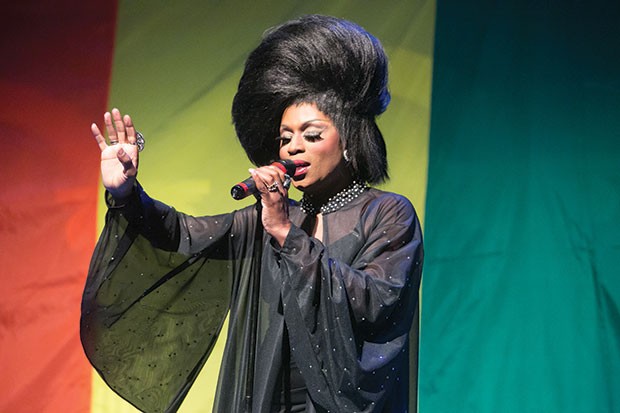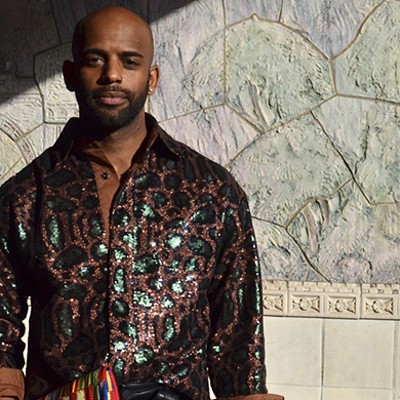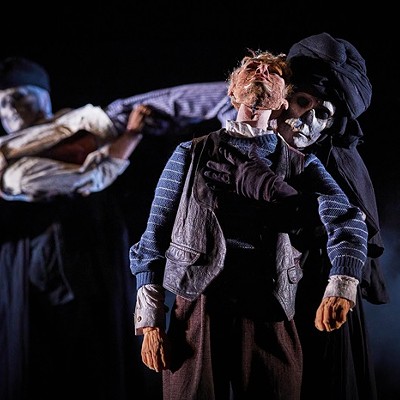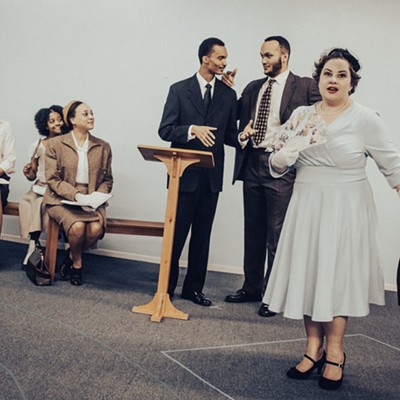In 1993, Kierra Darshell and her drag mother, Denise Darshell, organized the inaugural Miss Tri-State All-Star Pageant, surely Pittsburgh’s first annual drag competition. In Pittsburgh, the fine art of female impersonation was then limited to gay bars, so this was a big step. Kierra had been doing drag for just four years, in clubs including Downtown’s fabled Pegasus, but was determined to take drag to a wider audience. That first pageant, held in the ballroom of the Radisson Hotel in Monroeville, went well. Miss Tri-State even survived Denise’s death, in 1995.
“One of the things she said to me before she passed away was to continue on with the pageant and not to have people get involved to change the concept of what we wanted. ‘You have business smarts, you can do this. Keep the dream going, keep it alive,’” says Kierra today. “And I told her, ‘I’ll try to [do it] as long as I can.’”
Miss Tri-State — which later relocated to a North Hills hotel and, in 2011, to Downtown’s Cabaret at Theater Square — flourished; thanks partly to the pageant, Darshell bills herself as Pittsburgh’s First Lady of Drag. But Darshell says the 25th Miss Tri-State will be the last. Rather than the usual contest, the Nov. 5 event will be a showcase for some 14 past winners donning makeup, wigs and gowns for a valedictory round of lip-syncing, dance moves and glitter-bomb attitude.
Many lamented the news. Last week, for instance, when Darshell hosted a drag-community tribute to designer and Eons Fashion Antique owner Richard Parsakian, her announcement that Miss Tri-State was wrapping drew scattered affectionate boos.
“I hate to see it come to an end,” says Jennifer Warner, who won Miss Tri-State in 1996 as a Virginia-based queen and has returned to emcee most years since. “Pittsburgh is a second home to me.”
But Darshell says, “I’ve always been one that believes that sometimes it’s good to stop things while it’s still going well, while we’re still on top.”
Modern drag pageants date to 1972, with the founding of the Miss Gay America, in Nashville. That event remains limited to men living as men who practice female illusion; newer pageants, like Miss Continental, allow transgender contestants. Miss Tri-State is open to anyone born male. (Two smaller-scale annual events Darshell produces — the Mr. Tri-State All-Star Pageant, for drag kings, and the Miss Newcomer pageant — will continue.)
Miss Tri-State included interview, evening-gown and talent categories. Winners got cash prizes of up to $800 — plus, naturally, tiara and sash — and many later won national crowns, including Shae Shae LaReese (Miss US of A), Alana Steele (Miss Entertainer of the Year) and Daesha Richards (Miss Continental Elite). Warner, who performs nationally, says that Miss Tri-State is known as a strong show with fair judging — and one that runs on time: “There is no ‘drag time’ with Kierra Darshell.”
Miss Tri-State, which Darshell says routinely sells out, has been part of a changing cultural landscape. By 1997, for instance, the pageant was mainstream enough to be hosted by local TV weatherman C.S. Keys. In 2007, Darshell began staging drag showcases for the SouthSide Works shopping complex. And since 2009, reality-TV show RuPaul’s Drag Race has put drag — whose practitioners could once get arrested for doing their thing — in living rooms weekly.
Darshell now produces drag showcases everywhere from The Mattress Factory to the Westmoreland Museum of American Art; recently, this ringer for Diana Ross performed at a local fundraiser for Gov. Tom Wolf. And she’s seeking a venue to continue her popular, bi-monthly Drag Brunch, held at the soon-to-close James Street Gastropub & Speakeasy. (Darshell says her drag productions are profitable, though she maintains a career in what she calls her “boy life.”)
Some observers contend that, in the age of RuPaul’s Drag Race and edgier styles of makeup and costuming, classic-style pageants struggle to stay relevant. Darshell agrees that things have changed. For instance, she was taught that drag is all about “[b]eing flawless, you know, having flawless costumes, flawless gowns on, hair and makeup, shoes. Everything is like together, completely,” she says. “But now today we do see some of the young queens … who feel comfortable coming on stage with shirts on, or some jeans on.”
The Legendary Misty Knight, a mentor to Darshell, adds that shows are harder to stage today, in part because drag is so widespread, with more pageants competing for talent. “There’s at least one pageant somewhere in the country every night of the week,” Knight quips. “They’ve kind of lost their sparkle.”
Darshell, however, hasn’t. She’ll keep performing, minus one size-6 perk. “When I started Tri-State, I said that I would always buy myself a brand-new gown. And in 25 years, I’ve never had the same gown on for Tri-State,” she says. “So you figure, worst-case scenario, I’ve got 25 lovely gowns!”


















